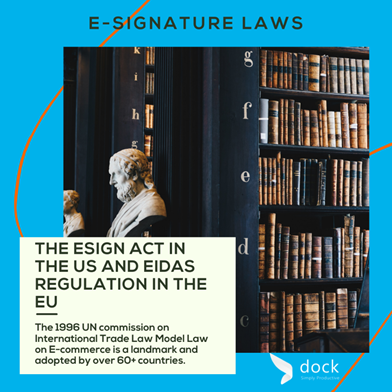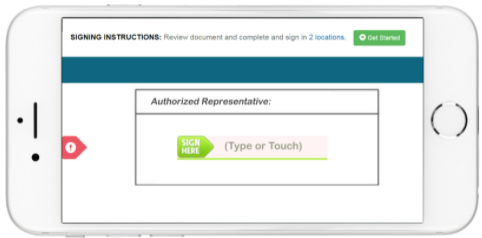
The Difference Between Electronic Signatures and Digital Signatures
Electronic signatures and digital signatures are used for contracts and legal agreements. There are various laws to govern the legal implications of these signature types worldwide. In the United States, the US Congress legalized electronic signatures with the Electronic Signatures in Global and National Commerce Act (ESIGN) in the year 2000. Several countries followed suit and began to legally adopt a form of electronic signature.

Electronic signatures were initially thought of as a luxury business feature. But as time and technology progressed, electronic signatures swiftly became the norm in the majority of organizations. Electronic signatures drive today’s digitally-based business environments and marketplace. With electronic signatures, companies can improve speed and efficiency while substantially reducing costs.
You might have some lingering questions about the diff between digital signature and electronic signature. Is there even a difference between the two?
We’ll discuss the complexities of each to provide you with more knowledge about these two revolutionary business tools within today’s digital era.
What is an Electronic Signature?
Electronic signatures are signatures captured on mobile devices or computers by typing or drawing your personal signature onto a screen. An e-signature is placed onto an electronic contract, agreement, or document. By leveraging the features and capabilities of e-signature technologies, your business’s contract management processes can be supported and streamlined in multiple ways.
Using an e-signature instead of a traditional, physical signature is efficient and accessible for each party involved in a contract or agreement. Today, there are many several electronic signature solutions to explore that will provide you with all you need to decrease turnaround times during this critical step in the contract lifecycle management process. Having a fast and effective signing step gives your company the edge over your competitors, increasing the value of your product overall. Implement the best e-signature software so you can increase the speed and productivity of your contract lifecycle management system today.
E-signature is the way to go because its manual, in-person alternative takes a lot of time. When a physical contract is signed, it’s important to consider the next steps – shipping, scanning, etc. In this manner, it’s evident that an electronic signature solution is certainly more time-efficient and cost-efficient.
When using electronic signature software, it is essential that every e-signature is captured securely within its corresponding document. With encryption and cloud storage features, signed files can be safely stored, remain confidential, and be kept secure from tampering. Electronic signature software can detect tampering, send an alert immediately, and then invalidate the tampered signature.

What Makes Digital Signatures Different from Electronic Signatures?
A commonly held misconception is that digital signatures and electronic signatures are one in the same. However, the main difference between the two signature types is that a digital signature is a mathematical algorithm that serves as an identifier for signature authenticity and integrity. The digital signature develops a unique virtual identifier that the signer authenticates by signing a document, contract, or other type of legal agreement.
The “virtual fingerprint” that a Office 365digital signature provides is essential to the protection of documents and the identification of users on the signature platform. All in all, the main difference between digital signatures and electronic signatures is in how signers and companies are authenticated and identified.
A Office 365 digital signature uses public key infrastructure (PKI) within the signature process in order to identify those requesting signatures and those providing them. The PKI produces a public and a private key to identify signers. The signer and document holder must have a digital certificate from a certificate authority so you can successfully link the signature to the signer.
Both digital signature and electronic signature are able to provide identification of signers as well as collect legal signatures – however, Office 365 digital signature certificates are a requirement for an individual to be able to provide their digital signature.
Why Choose Electronic Signature Instead of Digital Signature?
Electronic signatures and digital signatures are both legal and highly secure – the two main reasons why the majority of businesses today have transitioned over to using e-signatures. Electronic signatures are far more secure than physical signatures because they are tracked by digital audit trails (composed of contract copies, emails, and signed certificates) making them easily trackable and verifiable. The Electronic Signatures in Global and National Commerce Act (ESIGN Act), the Uniform Electronic Transactions Act (UETA), and the electronic Identification Authentication and trust services regulation (eIDAS) are several examples of legislation in the United States and the European Union that demonstrate how electronic signatures have become well-trusted worldwide.
Electronic signatures are fast, secure, cost-efficient, and accurate. In addition, using an electronic signature can boost approvals and improve client satisfaction. By leveraging an electronic signature platform, your business can easily identify signers, securely collect legal signatures, and efficiently store signed documents and contracts. However, with a Office 365 digital signature, you have the additional speedbumps and costs that come along with obtaining digital certificates.
Electronic signature solutions can automate the signature step of your contract management process. This simple switch makes all the difference in saving both money and time. Electronic signing saves money by increasing accuracy. The risk mitigation benefits offered by an electronic alternative for signing inadvertently saves costs by reducing errors that occur, and thus, the time and money spent fixing them.
Here at Dock 365, our Sertifi eSignature integration can help your business accelerate the speed of contracts, improve the security of signatures, boost cost-efficiency, increase accuracy, enhance customer satisfaction, and maximize upon approvals.
Conclusion
While electronic signatures and digital signatures share some similarities, they certainly have distinct characteristics that differentiate the two. We strongly suggest utilizing an electronic signature solution for your contract management system so you can simplify the signature process and making signing easy for your clients and vendors.
Dock 365 is an expert in Office 365 and SharePoint-based contract management solutions that will help your company in all of your contract management needs. Take your contract management process to the next level.
Ready to get started today? Reach out to us to learn more about our Dock 365 Contract Management System.
If you would like more information, we welcome you to schedule a free demo with us today.
Book a Live demo
Schedule a live demo of Dock 365's Contract Management Software instantly.

Written by Lindsey Paulk
Lindsey Paulk is a Content Writer in Jacksonville, Florida that specializes in digitally communicating all-things contract management.


